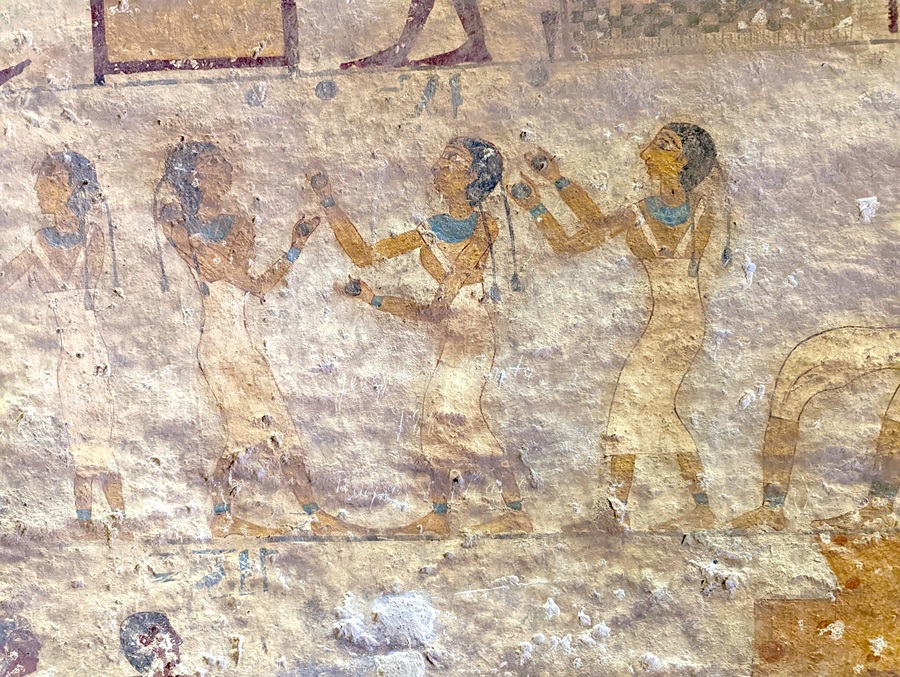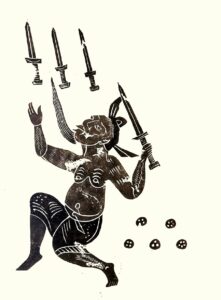Thom Wall enjoys holding a knife between his teeth and balancing objects like wine glasses and playing cards on the pointed tip. The trick falls under a discipline called “mouthstick.” Wall, a professional juggler, says that is “exactly what it sounds like.”
“I can balance a military saber point-to-point on the tip of a knife that I’m holding in my teeth,” he says. If that’s not enough, as the saber slowly spins on the knife, Wall will drop into the splits. “For my money,” he says, “that’s one of the prettiest things that I do.”

On Sunday, Wall will be part of Cirque Fest at the Wellfleet Harbor Actors Theater: a two-day event that includes the world premiere of Payomet’s short documentary film A Cirque by the Sea and a “juggle jam” with Cirque by the Sea’s Trevor Pearson. But for this appearance, Wall won’t perform a juggling act. He’ll give a talk on the ancient roots of the art form based on his book Juggling — From Antiquity to the Middle Ages: The Forgotten History of Throwing and Catching.
Wall has been performing for a living since 2009, when he graduated from Washington University in St. Louis “with a degree in German languages and literature, then straight into the recession.” He asks, “What was my marketable skill?”
When Wall was a kid, juggling became his main hobby. “I learned how to juggle three balls from a book,” he says. Later he searched the web and found a juggling club two miles from home.

“My folks were thrilled that I had an interest outside of school,” he says. Juggling itself was fun but his fellow participants were the real attraction. “It was those social connections that kept me coming back.” He participated in juggling festivals, of which there is a “global network,” and has met hundreds of fellow performers over the years.
After college, he moved to Colorado, performed on the street and, later, as the opening act for a circus sideshow. “You know, like sword-swallowers and stuff like that,” he says. He was a soloist with Cirque du Soleil for five years, performing on four continents. Now he works in “show biz,” as he calls it, as a headliner on cruise ships.
But Wall also has another career. He’s the lead editor for the small nonfiction publishing company Modern Vaudeville Press, whose aim is to improve the circus library. The press has published 27 books in three languages. “They’re being cited by graduate and doctoral dissertations left and right,” says Wall. “There’s clearly a need for the stuff that we’re putting out.”
As it stands, “Circus is known by everyone and studied by no one,” says Wall.

His talk at Cirque Fest is mostly about the ancient origins of juggling. “The earliest representations of juggling date from around 2000 or 2100 BCE,” says Wall. At Beni Hasan, a funerary complex in Egypt, there is a tomb image that shows a procession of three women, all tossing three balls. “To a juggler, it’s pretty clear they’re juggling three different patterns,” he says.
In almost every culture on Earth, says Wall, “we have evidence of some kind of a skill-based game that involves throwing and catching more objects than hands.”
Feats like juggling appear across time in places utterly disconnected from each other, says Wall. “Ancient Egyptians were not talking to Islanders in the South Pacific, right?” he says. “Every civilization on Earth has some connection to the human behaviors we call circus disciplines.”
In performances, Wall often tries to recreate circus tricks from the past. “A lot of these acts pre-date cameras,” he says. Much of the time, written records of the tricks are unreliable. “If there’s somebody juggling five balls, half the people in the audience are going to think it’s nine or seven or three.” To uncover the techniques, he reads about a trick and looks at drawings and promotional photographs, trying to decipher how it was accomplished.

Wall feels it is difficult, maybe impossible, to define what a circus is. “Some people say ‘circus’ and they’re referring to a discipline like juggling or trapeze,” he says. “People refer to capital C ‘Circus,’ and that’s in reference to the circus industrial complex — Ringling and Cirque du Soleil, show biz, entertainment, big money apparatus. Some people, when they say ‘circus,’ are literally referring to the word ‘circle.’
“A hundred years ago,” he adds, “you could walk down the street and ask anybody, literally anybody, ‘Who’s your favorite juggler?’ And that random person on the street would have a very specific answer, and a reason why.” Today, he says, most people just know what a juggler is, and that’s where their knowledge stops.
Juggling, says Wall, is a human attempt to succeed against a universal experience — gravity. The primate shoulder developed to be able to throw horizontally and vertically. “If you can throw one rock, why not try two?” says Wall. “If you can throw two rocks, why not try three?”
On the Up and Up
The event: Cirque Fest (part of Payomet Cirque by the Sea)
The times: Sunday, Nov. 10, “The Ancient Roots of Juggling” with Thom Wall, 12:30-1:30 p.m.; outdoor juggle jam with Trevor Pearson, 1:30-4 p.m.; world premiere of documentary short A Cirque by the Sea, 5 p.m.
The place: Wellfleet Harbor Actors Theater, 2357 Route 6
The cost: Free
